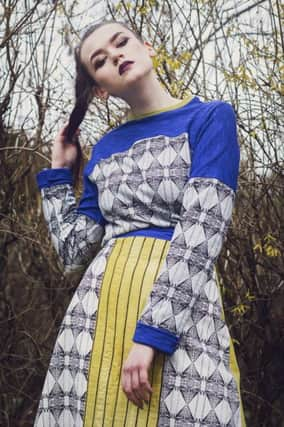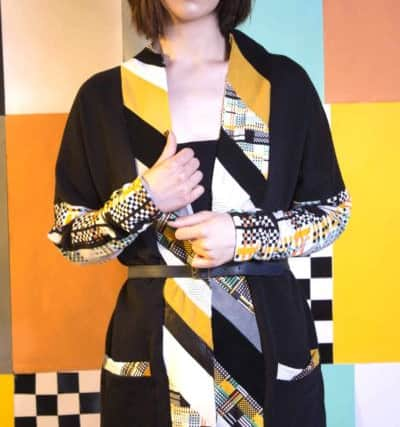Scottish designers join global push for ethical fashion


Some of Scotland’s top fashion designers and innovators are mobilising as part of global Fashion Revolution week in a bid to transform the industry’s social and environmental credentials one thread at a time.
Events in Edinburgh and Glasgow will mark the campaign was set up following the 2013 collapse of the Rana Plaza complex in Bangladesh, which killed 1,134 people - many of them textile workers - and injured over 2,500.
Advertisement
Hide AdAdvertisement
Hide AdKey figures in Scotland are now bringing the campaign to instil a greater social and environmental consciousness into fashions houses, high street brands and manufacturers closer to home.


In Edinburgh last night, designers and fashion academics gathered at the Edinburgh Centre for Carbon Innovation (ECCI) to discuss the way forward for sustainability in the industry at a time when around seven tonnes of textile waste is thrown away every five minutes in the UK.
In Glasgow, similar events are being held at The Lighthouse where designers, shoppers and seamstresses will gather to broaden understanding of “who made my clothes?”
Amongst those at The Lighthouse last night was Glasgow-based fashion designer Aimee Kent who has recently launched her latest ethical fashion and textile line in New York.


She has long been concerned by the lack of transparency in the industry over workforces, manufacturing processes and environmental standards held by the industry, particularly the high street brands,
At her Glasgow factory, Ms Kent uses local seamstresses, organic materials and special filtration systems to reduce harmful by-products from the printing process entering the local water system.
Ms Kent, 29, said: “What we are really trying to do with Fashion Revolution is get consumers more acquainted with the production methods and manufacturing processes that brands use.
Advertisement
Hide AdAdvertisement
Hide Ad“There is a lack of transparency within the fashion and textile industry, particularly in the way that a lot of the high street brands work and produce their clothing.
“We want to get consumers to engage with brands who make their clothes and learn about the people and methods behind them.
“I suppose with fashion, its very glamorous up-front but there are an awful lot of dark stories behind the production of garments.”
Ms Kent said ethical issues facing the industry were numerous, from a lack of education for farmers using pesticides to vast amounts of water used in the manufacture of some garments, such as jeans.
“Fashion has a massive impact on people, on the environment and the climate due to the massive carbon footprint involved in UK brands manufacturing in countries such as India,” she said
Ms Kent recently worked on a collaboration with Love Your Clothes, a campaign which urges smarter buying of fewer garments and care of repair of clothing, Zero Waste Scotland and the Salvation Army, which donated 50kg of second hand clothing to the designer.
She has now created a completely up-cycled range of items which are soon to go on sale.
Advertisement
Hide AdAdvertisement
Hide AdMs Kent said the price point of ethical goods was a “bit higher” than a consumer would normally want to pay but that garments came with a number of assurances. The designer added: “As consumers we tend to go for the cheapest option, but it is not always the best option.
“That cheap garment is probably having an impact on the lives of the workers who produced it.
“Our price point is a bit higher that what you would probably want to pay but what you are getting for that is an assurance that you are not exploiting anyone and that you are supporting local business and local crafts people.”
Other designers, manufacturers and innovators taking part in Fashion Revolution in Scotland include Karen Finlayson, who has worked alongside the ECCI to create Colour Elements, an app that selects which colour of garments work best for the user. The overall aim is to look good but also make wardrobes “leaner” given fewer wasteful purchases.
As part of its support for Fashion Revolution Week, ECCI was transformed into a sustainable clothing market last night with the documentary on the fashion manufacturing industry, True Cost, also shown.
Firms taking part in the market included textile firm Brora, which specialises in cashmere, Glasgow-based bags and luggage company Trakke and the TrashFashionistas organisation, which turns used items such as bicycle inner tubes into jewellery. Annabel Cooper, communications officer at ECCI, said: “The fashion industry and what we as citizens wear every single day, has huge relevance and huge consequences on human, social and environmental capital – a recent BBC documentary highlighted that in the UK alone, we are disposing of seven tonnes of textile waste, every five minutes.
“At ECCI we aim to bring people together from all sectors and areas of expertise to work together to take positive steps towards a low carbon future.
Advertisement
Hide AdAdvertisement
Hide Ad“It’s a real privilege to be able to host this screening and discussion on recognition of Fashion Revolution Day 2016 the Edinburgh Centre for Carbon Innovation and to bring local makers to showcase their work and add their voice to the conversation on a sustainable and ethical fashion future.”